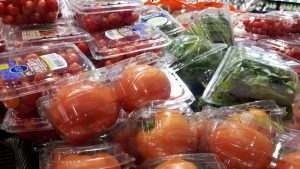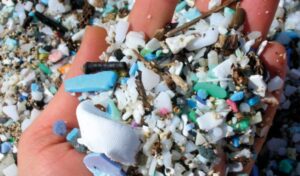- Regulatory Tools
- Circular Economy
- Government
- Government Policy
- Labelling
- Recycling
- Policy
- Strategy and Policy
- Take Action
- National
Mixed recyclables are headed to an Ontario landfill. Here’s why
A major Canadian waste collector has told McMaster University and other clients that some of their recyclable materials will be dumped in landfill, blaming its decision on “what appears to be a permanent closure” of Asian recycling markets that previously welcomed plastics, cans, glass and paper from the west.
The cascading impact of China’s decision to block the imports of most materials is forcing some Americancities to abandon parts of their recycling programs, resorting to landfills or incineration. Other Asian countries, like the Philippines, have returned containers of dirty Canadian materials warning they will no longer be the dumping ground for garbage.
In a letter dated June 20, Waste Connections of Canada informed its institutional, commercial and industrial clients in the Hamilton region that those decisions had an impact on mixed materials like plastics, metals, paper, glass or cardboard that are dropped in one recycling bin.
“There is no facility willing to continue accepting what has been called in the market commingle or single stream recycling, of which you have with us,” Waste Connections wrote. “As of July 1st, all remaining commingle bins on customer sites will be serviced as waste.”
Pio said the company is limiting recyclables going to landfill by proposing separate containers for materials, like cardboard.
Mixed recycling, he said, became popular over the years. “While we offered the commingled service, it was not our preference. We are advocates of source separation.”
The restricted access to major markets like China is a reckoning for western countries — and companies — that produce millions of tonnes of plastics and packaging.
For roughly 25 years, Pio said, Canada and numerous other countries shipped the majority of their recyclables to China, with more than 20,000 tonnes of plastic arriving there each day.
In early 2018, China shook up the international recycling industry with its formidable “National Sword” policy that allows a contamination level of 0.5 per cent or less on items like cardboard that are often rendered useless thanks to grease or peanut butter.
China also banned 24 categories of materials, including many common plastics and “unsorted” paper, like office letterhead mixed with cardboard and magazines, which are time-consuming and expensive to separate.
“This ban has caused a collapse in the recycled materials market,” Pio wrote to the Star.
“Put simply, there does not exist today the infrastructure to properly address this change in global recycling markets. This has led the industry and Waste Connections to take interim measures, which are far from ideal,” he said.
Waste Connections owns the Ridge Landfill in Blenheim, in southwestern Ontario. It is applying to the Ontario environment ministry for an expansion. Pio said the application was made in 2016, before the Chinese restriction began, to deal with the province’s lack of landfill capacity.
A study by researchers at the University of Georgia said China’s new restrictions will displace 111 million metric tonnes over the next 10 years. The report, published in Science Advances, said that nearly 90 per cent of the previous recycling imports to countries like China were single-use plastic food containers. It called for “bold global ideas” to reduce and redesign plastic disposables.
If no action is taken, “then much of the waste originally diverted from landfill by consumers paying for a recycling service will ultimately be landfilled,” the University of Georgia report said.
In the previous system, mixed plastics, paper, or cans started their journey in a bin at a university, a business, or a city-run residential blue box program. A truck took the “single-stream” contents to a local processing facility for sorting. Processors sold the most valuable material and sent the rest overseas, sometimes through a broker, often bundling different compositions of plastics in one bale or mixed papers in another.
In China, facilities had a massive supply of low-paid workers to sort the different types of plastic. Some were bought by Chinese manufacturers, to repurpose in new items. The leftovers were usually garbage. Environmental advocates said that plastic waste often ended up in Chinese rivers and other waterways.
In July 2017, China warned the World Trade Organization of its plans, saying “we found that large amounts of dirty wastes or even hazardous wastes are mixed in the solid waste that can be used as raw materials. This polluted China’s environment seriously.”
When the new rules were enforced in early 2018, countries like Vietnam, Malaysia, Indonesia or Thailand took some shipments but they, too, started restricting imports.
While some say North America does not have the processing capacity to manage the new volume of materials, others argue that Canadian subsidies to the fossil fuel industry make it cheaper to continue making new plastics instead of recycling what already exists. That means the volume of near-indestructible plastics constantly grows. Various tax credits, deductions and grants give the Canadian fossil fuel industry more than $3 billion a year in subsidies for exploration and production, according to a 2016 report.
A 2019 report on recycling by the University of Ottawa-based Smart Prosperity Institute said, “Canada has historically exported significant amounts of mixed plastic waste to China and Hong Kong because it is uneconomic to sort and process it domestically.” The report recommended a federal requirement for 25 per cent recycled content in new plastics. Europe’s plastics strategy includes a law requiring 25 per cent recycled content in plastics by 2025 and 30 per cent by 2030.
International regulatory controls are growing tighter, creating another incentive to better manage recyclables. Plastics were recently added to the “Basel Convention on the Control of Transboundary Movements of Hazardous Wastes and their Disposal.” Canada is a signatory to the convention.
Under the Basel Convention, if a Canadian company wants to send a load of plastics to a country like Indonesia, it would need official authorization from the Indonesian government. It would have to show that an Indonesian processor can properly manage the materials and dispose of no more than a certain amount. If accepted, the government would issue permits for companies to send and receive the material.
One positive glimmer to emerge is the possibility that governments, like Ontario, will get serious about extended producer responsibility and implement regulations requiring the companies that make or sell products to take them back for recycling.
“This has shone a much needed light on how our business actually works and where the materials end up,” said Matt Keliher, solid waste general manager for the City of Toronto.
“I think it is a good turning point where we can look at it from a North American perspective of how do we generate the economy here to manage the materials that we produce and use here,” Keliher said.
“What can we do to push that processing economy forward and create jobs, create innovation and create better ways of managing material — or create less material which is the most preferable,” he said.
Ontario has plans to move toward extended producer responsibility of its blue bin recycling program, which would make companies that produce plastics or paper responsible for 100 per cent of their recycling costs. Currently, the producers are required to pay up to 50 per cent of the costs.
Many questions remain, however, on whether it will have strict collection targets for materials like plastic bottles to make sure as many as possible are turned in for recycling. A recent report by Deloitte concluded that Canada recycles just 9 per cent of its plastics with the rest dumped in landfill and incinerators or tossed away as litter.
Environmental advocates say collection targets of 90 per cent could be achieved in Ontario through a deposit return system for non-alcoholic bottles along with a requirement that new plastic bottles include a percentage of recycled material. Reloop’s Morawski commissioned a study that found a deposit-return system for non-alcoholic beverage bottles in Ontario (with a 15 cent deposit fee) would eliminate 118,000 tonnes of plastic, glass and cans from landfill, incinerators and litter.
Deposit returns on plastic bottles are gaining popularity in Europe, where disposable plastics are being upended by new laws. The European Commission, the law-making arm of the European Union, recently issued a directive that outlined a ban on single-use plastics, such as cutlery and cups, starting in 2021. Europe is imposing a 90 per cent collection target for plastic bottles by 2029.
Those are the big changes. Smaller initiatives also have an impact. The Recycling Council of Ontario created a program called 3RCertified that does a line-by-line dissection of a company’s recycling practices and policies, to help the company reduce its output.
Mixed recycling is considered cheaper and faster to collect but can leave commodities like paper contaminated by food waste from leftover pop in soft drink bottles or grease from takeout containers. Once destroyed, those materials are garbage. About 30 per cent of Toronto’s residential blue bin contents is dirty from food and drink or items that don’t belong, like clothing. Residential programs, like the blue bins, and commercial and institutional collections all deal with contaminated materials.
In 2016, Chinese recyclers and manufacturers imported 7.3 million metric tonnes of waste plastics — worth $3.7 billion, according to Clarissa Morawksi, managing director of Reloop, a network of industry, government, and non-governmental organizations that promotes innovative recycling and business models.
Waste Connections told its clients it will still pick up and process separated recyclables, since China and other markets are willing to buy clean and separated materials.
McMaster University confirmed it received the letter and said it has been installing new bins across its campus to separate the materials so recycling can continue.
That solution could be short-lived. Waste Connections’ letter also included a warning: “For the time being cardboard, plastics, glass and metals collected separately remain recyclable with an end market, but we may see that change in the future as well.”
In a written response to the Star’s questions, Waste Connections of Canada CEO Dan Pio said 280 of the company’s 7,000 containers in the Hamilton area hold those mixed materials. Those bins service industries, commercial buildings or institutions like McMaster.
Linden Gossen of Sleeman Breweries in Guelph said the certification program has had a “huge” impact on recycling awareness among employees, some of whom have recommended new materials to help Sleeman increase its recycling levels. For example, when beer is transported in the back of a truck, plastic airbags are deployed to hold the beer safely in place. Those airbags wear out over time and staff asked that they be recycled, Gossen said.
Jo-Anne St. Godard, executive director of the Recycling Council of Ontario, said it is difficult to track materials collected in the industrial, commercial and institutional sector, so the council set standards through the certification program. St. Godard said it verifies recycling claims by examining haulers’ records to see where the material is taken and looks at company policies and employee training for ways to improve sustainability.
St. Godard said the market is struggling with a massive disruption. She has seen a copy of the Waste Connections letter and is not surprised that companies are sending some recyclables to landfill.
“There is probably a lot of this going on in the marketplace,” she said. “In my opinion they (Waste Connections) are being transparent with their clients.”
Read the full and original article at the WellandTribune.ca



